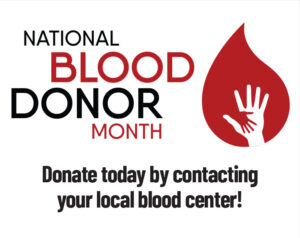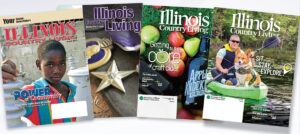
During the month of January, blood providers serving the state of Illinois wish to recognize blood donors who support the blood supply throughout the year and especially after the busy holiday season.
January has been designated National Volunteer Blood Donor Month because this month can present some of the greatest challenges for the blood supply – extreme weather, an increase in illnesses and the need to recover from losses due to the holidays, all contribute to the increased need for donors.
Between holiday closings and busy schedules for blood donors, we lose approximately 20 percent of donations compared to a normal week. Patient need at the hospitals we serve is constant, so it’s imperative that we gain additional appointments for donations immediately after the holidays.
Central Illinois Community Blood Center and Community Blood Services of Illinois are a part of Mississippi Valley Regional Blood Center (MVRBC), a regional blood provider serving 110 hospitals in Illinois, Iowa, Missouri and Wisconsin. While the blood center experiences ups and downs in the rate of blood donation throughout the year, the number of donations needed for patient care remains constant.
Working in the Midwest at this time of year means being ready for winter weather. Blood drive cancellations due to snow and ice are always a concern. Even as we recover from losses due to the holidays, we’re always mindful of the potential for a winter storm. We need to ensure we have blood “on the shelves” at our local hospitals at all times, in case a major storm would put a further dent in collections. That’s why we’re so grateful for the donors who provide for our blood supply during National Volunteer Blood Donor Month and throughout the year.
 Blood donation is a safe, simple procedure that takes about 45 minutes to one hour. For MVRBC, a photo ID or MVRBC donor card is required to donate. All persons age 17 and up (or 16, with a signed parental permission form) who weigh at least 110 pounds and are in general good health meet the basic eligibility requirements for blood donation.
Blood donation is a safe, simple procedure that takes about 45 minutes to one hour. For MVRBC, a photo ID or MVRBC donor card is required to donate. All persons age 17 and up (or 16, with a signed parental permission form) who weigh at least 110 pounds and are in general good health meet the basic eligibility requirements for blood donation.
All blood types are needed, but the demand for type O-Negative red blood cells and type AB plasma is especially high because these are universal products that can be transfused to patients of all blood types. These types are frequently used to treat trauma victims, who may need to receive a blood transfusion before their blood type is known.

Blood donors make a difference! Meet Milo and Brooks
The Beard brothers, Milo and Brooks, both received blood transfusions provided by volunteer donors at the time of their birth. Today, they are healthy, growing boys who help with the “Beard Brothers Give Back” blood drive in their hometown.








